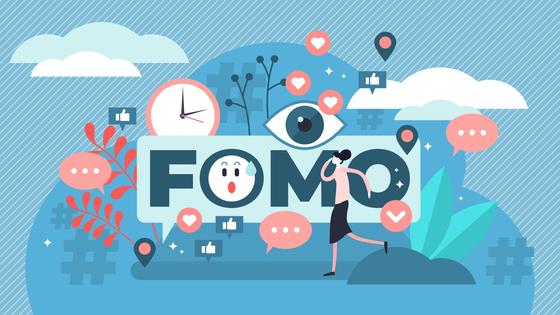Everything at Once: What Is FOMO and How to Recognize It in Yourself
Doing yoga, starting a personal blog, going on a round-the-world trip, or getting a new profession? Or maybe all at once?

That's exactly how the FOMO effect manifests itself-the obsessive fear of missing out on some opportunity or offer. Let's find out how this syndrome arises, who is most susceptible to it, and whether it's possible to cope with FOMO on your own.
What is FOMO

FOMO stands for "fear of missing out," or simply put, the fear of missing something important-or even unimportant. Sometimes, the FOMO effect is referred to as the "missed opportunities syndrome." Typically, a person affected by this believes that other people's lives are much more interesting and eventful. They worry that others are having fun and traveling, going on dates and falling in love, building successful careers and earning millions. At the same time, their own personal life, professional activity, and other areas seem boring, unsuccessful, and monotonous.
It's precisely the FOMO effect that prevents people from making decisions more easily. Usually, those experiencing this syndrome cannot make a choice for fear of missing out on something meaningful. Instead, they try to accept multiple offers at once, visit several places, and learn multiple professions-just so they don't miss anything. This distinguishes FOMO from another psychological effect-FOBO, or "fear of better options." This syndrome is characterized by literal paralysis-rather than making a decision or choosing, the person does nothing, postpones everything "for later," and suffers from procrastination.
In simpler terms, FOMO causes people to grab at everything they're offered, agree to any job, and try all kinds of entertainment. Meanwhile, a person with FOBO is paralyzed by the variety of choices. Another key difference between the two is that FOMO primarily harms the individual themselves, while FOBO affects those around them. This is because the person struggles to commit, constantly regrets their choices for no good reason, and often keeps colleagues, subordinates, and even loved ones in suspense because they cannot make decisions.
How FOMO Arises and Who is Susceptible
According to one of many studies on FOMO, both men and women are equally susceptible. Its emergence directly depends on the amount of time a person spends on social media and their overall psycho-emotional state, such as anxiety levels.
Scientists have found that people who are particularly neurotic-more anxious, restless, and emotionally unstable-tend to experience FOMO more often. However, psychologists identify dissatisfaction with life as the root cause of FOMO. The fewer ambitions and plans a person has realized, the more successful others appear in their eyes. Moreover, FOMO provokes a feeling of low self-esteem. To boost their self-worth, feel respected, and affirm their significance in society, people grab at every opportunity.
Another contributing factor is the basic human need to belong to a group. We want to feel part of something bigger, so we try to stay informed, agree to attend events we're not really interested in, and strive to be liked by colleagues and others. Otherwise, a person might feel abandoned and rejected, ultimately developing a fear of loneliness.
The lack of close, trusting relationships is another key factor contributing to FOMO. A deficit in communication can lead one to believe that others are living richer, more fulfilling lives.
Interestingly, all the emotions triggered by FOMO are fueled by social media. People have always wanted to stay informed, but in the past, this took days or even weeks. Now, one just needs to go online and watch events unfold in real time. That's why FOMO is often considered a faithful companion of excessive smartphone use.
Test Yourself for FOMO: A Checklist from Lectera

A few years ago, Oxford scientists found that 75% of respondents had experienced FOMO symptoms to some degree. In today's world, the risk of suffering from the missed opportunity syndrome is increasing. We offer you a special checklist to see if you are affected by FOMO. Tick off the statements that apply to you:
-
I check social media first thing in the morning.
-
I constantly think about what my friends are doing and what's happening in their lives.
-
I often compare myself and my achievements to others' success.
-
I want to be the best in every area.
-
I feel hurt when I find out my friends or acquaintances went somewhere without me.
-
I'm convinced that my friends and colleagues have far more opportunities than I do.
-
I often feel envious when someone talks about purchases, trips, or other life moments.
-
I don't like being offline for long-I'm afraid of missing important news or messages.
-
I lose track of time on social media, often mindlessly browsing the internet.
-
I keep tabs on former classmates and colleagues to stay updated on their lives.
-
I try to attend every event I'm invited to, even if I'm not interested in the topic.
-
I want to be liked by everyone and get upset if I find out someone feels negatively about me.
The more checkmarks you place, the higher the likelihood you are experiencing FOMO. Of course, this is not an exhaustive list. Each person with FOMO experiences it differently. Still, some common symptoms include:
-
an obsessive desire to stay up to date on everything;
-
constant worry about "what are my friends doing now, what's happening in their lives?";
-
belief that your own life is boring and monotonous;
-
desire to be liked by everyone and be "the best";
-
tendency to accept any offer or adventure;
-
impulsive shopping habits;
-
anxiety or restlessness when missing an event or opportunity;
-
difficulty focusing on the present moment.
It's normal to admire or even envy others-as long as it doesn't prevent you from living and enjoying your own life.
Lectera’s Online Courses by topic
Why FOMO is Dangerous: Consequences
Besides the many inconveniences-like spending too much time checking social media-FOMO can have serious consequences. For example, chronic fatigue and sleep deprivation, because people with FOMO impulsively accept all offers, even to their own detriment, just to avoid feeling like life is disappointing.
Wanting to stay informed takes a toll on our mental health, leading to prolonged stress and increased anxiety. Constant comparison with others also results in growing dissatisfaction and disappointment.
Moreover, FOMO wastes the most valuable modern resource-time. In the pursuit of countless opportunities, people spend excessive time and energy on activities that bring no joy or results. That time could be used to achieve real goals. As the saying goes, "Chase two rabbits, catch none." It's better to choose one meaningful path than to pursue illusory benefits.
How to Overcome FOMO

There's no universal solution to get rid of FOMO once and for all. It depends entirely on how the syndrome affects you personally. However, some general recommendations can help both with combating FOMO and preventing it.
Tip #1: Set Priorities and Goals
Remember: a day has only 24 hours. Don't try to do everything. Focus on what's important right now. Reevaluate your values regularly, listen to your desires, and avoid comparisons. Make choices and accept offers aligned with your values and goals.
Tip #2: Acknowledge Your Achievements
Write down in detail what you've accomplished, learned, and mastered in the past year or two. Thank yourself. This helps you avoid devaluing your progress. Allow yourself to be as successful as you can be now. Prioritize sleep and rest, and don't strive for unattainable ideals. Recognize that you-like everyone else-aren't omnipotent, and life will feel easier.
Tip #3: Practice Digital Detox
The more time you spend on social media, the higher your FOMO risk. Take breaks from mindless surfing, videos, and games-at least on weekends. Just a couple of gadget-free days can show you how much time you regain. Or detox daily-for example, one hour before bed offline. Your mental and physical well-being will improve.
Tip #4: Practice Mindfulness and Reflection
Mindfulness means being fully present and aware of the current moment. You can develop this through meditation, journaling emotions, or simply resting-an essential part of productivity. Reflection is equally important: analyzing your thoughts, actions, and choices helps eliminate obsessive thinking and leads to wiser decisions. Ask yourself questions like: "What exactly am I feeling?", "Do I like this feeling and why?", "Is this really important to me or do I just want approval?", "Could I act differently-and what would happen if I did?"
Tip #5: Replace FOMO with JOMO
In contrast to FOMO, there's the concept of JOMO-Joy of Missing Out. This means letting go of anxiety over approval, enjoying what you already have, and not chasing the unattainable. In quiet moments, you can hear your true desires. Figure out what's important to you-and what you can let go of easily.
Of course, the most effective way to deal with FOMO is regular psychotherapy. A professional can help you not only eliminate FOMO symptoms but uncover and address their root cause.
Still, practicing mindfulness, self-appreciation, and JOMO on your own is also beneficial. You'll learn to treat yourself with kindness and develop self-respect. Remember-you don't need external approval to love and value yourself.
Share this with your friends via:
Latest News

A significant stage in the development of the alternative education system has begun in West Northamptonshire in the UK: the County Council is actively calling on parents, guardians, and trustees to participate in shaping the future of this key area.

Outwoods Primary School in Atherstone, Warwickshire, having experienced deep sadness after the loss of their famous cat, Silla, has found solace in a new pet – a Maine Coon named Aloysius O’Hara.

In modern universities, artificial intelligence, and in particular ChatGPT, is rapidly transforming from a controversial tool into a full-fledged student assistant.

An innovative educational project is gaining momentum in UK primary schools, aiming to change attitudes towards video games.

The Massachusetts Institute of Technology (MIT) presents MIT Learn – a revolutionary online platform that opens a “new front door” to access university knowledge and resources.












 Test: How Psychologically Mature Are You? Check Your Inner Foundation.
Test: How Psychologically Mature Are You? Check Your Inner Foundation.
 Test. Check Your Social Media Dependency Level!
Test. Check Your Social Media Dependency Level!
 Test: What Business is Right For You?
Test: What Business is Right For You?
 Test: How Prone Are You to Abusive Behavior as a Manager?
Test: How Prone Are You to Abusive Behavior as a Manager?
 Test. What superpower would you possess if you were a superhero?
Test. What superpower would you possess if you were a superhero?
 Test. What Should You Let Go of Before Winter Ends?
Test. What Should You Let Go of Before Winter Ends?
